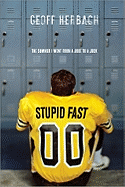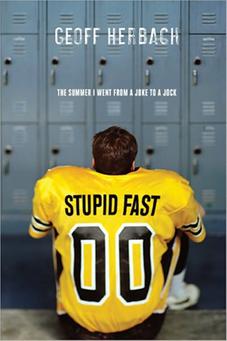
 In his first book for young adults, Geoff Herbach (The Miracle Letters of T. Rimberg) gets
to the heart of what happens in puberty--when the physical changes happening to
your body take you to places you'd never dreamed you would go. The author
explores, with insight, humor and unexpected moments of poignancy, the
transformation that occurs during the summer in Bluffton, Wisc., when Felton
Reinstein turns 16. Felton's first clue was when he sprinted the entire
600-yard dash in a spring gym class, outpacing even the best runners by 150
yards ("stupid fast"). His mother, Jerri, witnesses his accomplishment,
and at first she encourages him. Then, as he shoots up to 6'11" and 168
pounds, and coaches line up to talk to him, Jerri begins to withdraw.
In his first book for young adults, Geoff Herbach (The Miracle Letters of T. Rimberg) gets
to the heart of what happens in puberty--when the physical changes happening to
your body take you to places you'd never dreamed you would go. The author
explores, with insight, humor and unexpected moments of poignancy, the
transformation that occurs during the summer in Bluffton, Wisc., when Felton
Reinstein turns 16. Felton's first clue was when he sprinted the entire
600-yard dash in a spring gym class, outpacing even the best runners by 150
yards ("stupid fast"). His mother, Jerri, witnesses his accomplishment,
and at first she encourages him. Then, as he shoots up to 6'11" and 168
pounds, and coaches line up to talk to him, Jerri begins to withdraw.
Herbach perfectly captures the unexpected tradeoffs that come with gaining acceptance in one arena while losing one's foundation. At the same time that Felton starts to get positive attention from the jocks who had ostracized him (they called him "Squirrel Nuts"), his main source of emotional support begins to falter. Felton's geeky best friend, Gus, goes to visit his ailing grandmother in Venezuela for the summer, and Felton's mother retreats further from Felton and his 13-year-old brother, Andrew, a talented pianist. Just when Felton finds that all he can do is sleep, eat and lift weights, his mother stops going to the grocery store. He is a gentle giant who, on one hand, cares about his family and, on the other, wants to embrace his new calling and go for speed and strength, and let his wacky family fend for themselves.
Felton begins his story by explaining that he found his father hanging in the garage when he was five ("This could be a dark tale!" he says. "It's not"). Jerri wouldn't talk about their father to him or Andrew except to say, "Your father was a sweet, fat American Jew." But now Andrew has questions, and Jerri is shutting down rather than opening up. Luckily, as Felton bemoans having to take over Gus's paper route, his new job puts him in the path of Aleah Jennings, whose father is renting Gus's house for the summer. Andrew informs Felton that she is "probably the best 16-year-old piano player in the universe." Still, Felton is barraged by thoughts of his mother and keeps her sudden changes in behavior secret: "Am I driving Jerri crazy by eating everything? Maybe Jerri really needs my paper route money?" he wonders. His questions feed a larger mystery at the center of the novel, which echoes the universal question of what happens to parents when their children are closer to adulthood than childhood. If the narrative rambles at times, you will forgive Herbach because it's all so true to Felton's stream-of-consciousness meanderings. It's rare to gain access to a male teen's thoughts at his most vulnerable, as he builds tenuous friendships with his weight-lifting companions, and takes Aleah's hand, "which made me totally dizzy and sort of sweaty." Felton is a hero for all readers--male and female. And Herbach (who admits to growing up in Wisconsin as "both a dork and a jock") is a writer to watch.--Jennifer M. Brown

